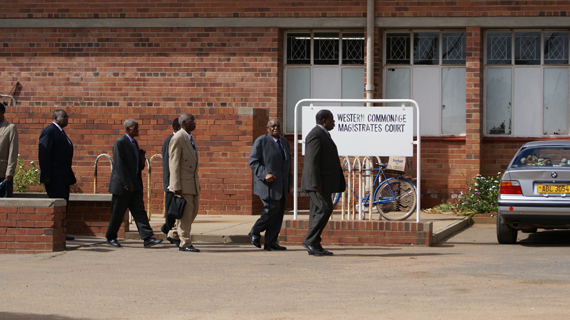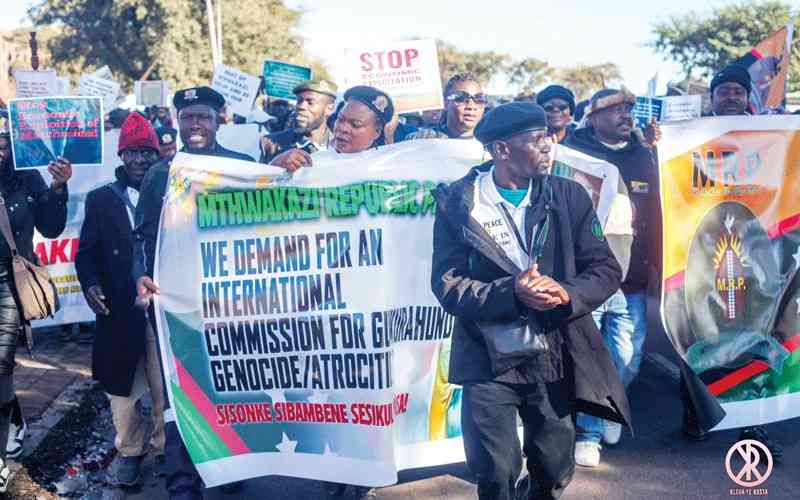

A POWER struggle and alleged tribalism rocking one of Zimbabwe’s oldest churches, the Apostolic Faith Mission of Africa International (AFM) in Lobengula, Bulawayo, yesterday spilled into the courts.
SILAS NKALA STAFF REPORTER
Some disgruntled members applied for a protection order against the overseer Tony Tshuma and 40 others accusing them of unleashing violence against those opposed to the church leader.
The application was filed before magistrate Tancy Dube at the Western Commonage Magistrates’ Court just a few days after it was reported that the church had been plagued by disaffection caused by alleged ethnic wars between Ndebele speaking worshippers and their Shona speaking counterparts.
The divisions reached boiling point and death threats are reportedly being traded between the warring factions.
The disenchanted group comprising more than 50 members has also accused Tshuma of fraudulently taking over the reins of the church in 2008 and abusing church funds.
He is also accused of threatening those against his leadership with either death or expulsion. The overseer allegedly grabbed the church-owned Lydead Range Farm in Gwanda.
In an affidavit, lawyer Claudious Manamela, who is representing the 50 disgruntled church members wrote: “The church has been automatically divided into two factions because of several misunderstandings each and every time we meet for worshiping and meetings.
- Chamisa under fire over US$120K donation
- Mavhunga puts DeMbare into Chibuku quarterfinals
- Pension funds bet on Cabora Bassa oilfields
- Councils defy govt fire tender directive
Keep Reading
“Tony Tshuma, being the ring leader of the other faction, incites the members whose names are on the attached annexure (40 members), to engage in violence threatening us physically since February 23 2014.”
Lawyer Walter Nyabadza of Majoko and Majoko, who was representing Tshuma and 40 other members, sought the dismissal of the application.
“The respondent would like to make a preliminary point in the plea that this court dismisses the application by the applicants,” he submitted.
“It is in the respondent’s plea that this court is not supposed to deal with this matter.
“Looking at the founding affidavit of the applicant; it is clear that he is standing as an applicant not in his capacity, but representing a certain faction that has signed a purported resolution.”
Nyabadza said the reading of the affidavit showed that Manamela was not alone in the application and that meant the move was a “class action” which cannot be dealt with by any other court in Zimbabwe, except the High Court.
He said in terms of the law contained in the Class Actions Act Section 2, Manamela and his faction had made a default legal action by filing a protection order application in the wrong court.
“I submit that the matter brought to this court is a class action and that the applicants proceeded in a wrong procedure and approached the wrong court and this matter must be dismissed,” submitted Nyabadza.
“The applicant also has no locus standi (the right to bring an action) to represent the church members in that he instituted the wrong process. In the event that this court does not consider the special plea, the respondent would like to request for further better particulars from the applicants as follows: Whether the peace order is against the respondent in his personal capacity or as an official; when did the applicant become a member of the church?”
However, the magistrate interjected indicating that it would be unfair for the applicant to only hear of the respondent’s opposition submissions orally in court yet the defence lawyer had not served him with papers.
“It’s unfair for the applicant to hear what you are saying here in court yet he has not been given the opposition papers,” Dube said.
“He served you with the papers and you should have responded so that he also comes here armed with your papers to challenge you.
“At the moment, he has no opposition papers and how would he respond to what you are saying if he has read nothing from you.
“The papers would have made him understand what you are talking about rather than you having to ambush him here,” the magistrate added.
The magistrate ordered that Nyabadza serves Manamela and his group with opposing papers to enable them to discuss as a group.
Dube remanded the matter to April 17. The disgruntled group has also accused Tshuma’s son Joseph of similar charges of threatening church members.
Joseph, who is also a Zanu PF activist, is accused of threatening to use his political connections to deal with congregants who opposed his father’s continued leadership of the church.
Joseph, who is reportedly in charge of the church’s farm, vehemently defended his father in an interview with Southern Eye and denied interfering with operations of the church or grabbing the farm.
He said the infighting was fuelled by tribalism and accused some congregants of mobilising against his father’s ouster because they did not want to be led by a Ndebele.
Tshuma has presided over the church since 2008.










